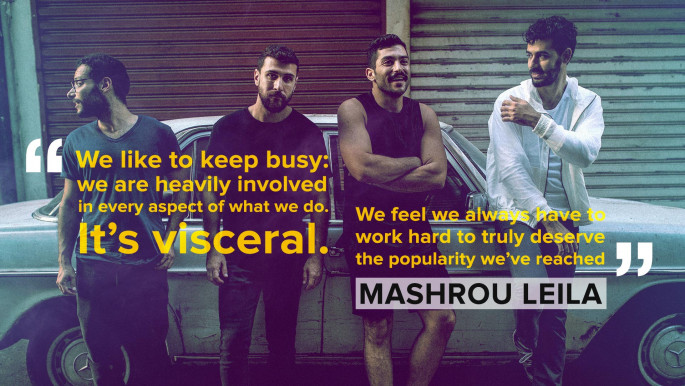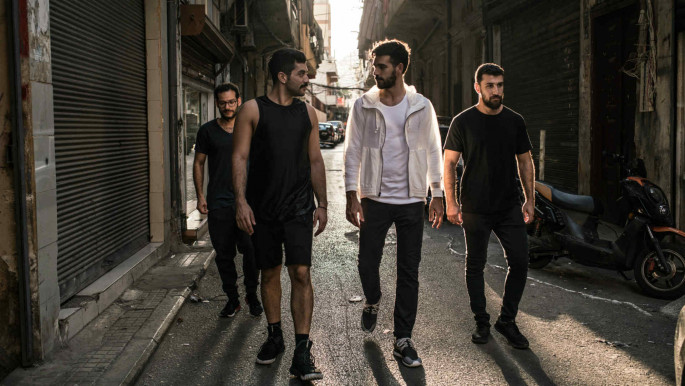Exclusive: an interview with Mashrou' Leila - 'This is how we made it'
Away from the studio sets and concert back stages, band members Hamed Sinno, Haig Papazian, Firas Abou-Fakher and Carl Gerges took a stroll with The New Arab through the Beirut neighbourhood of Bourj Hammoud to talk about growing-up in a country recovering from a civil war and how it has affected them; why their lives are mostly about hard work, not glamour; how they have overcome their biggest challenges - both as a band and individually; the secret to their alchemy as a group and their upcoming plans to teach for a semester at New York University in the United States.
Hamed, the lead singer, and Firas, the guitarist, arrived at the Armenian cultural centre cafe 'Badger', where part of the interview took place, by Uber. Haig, the violinist, walked, while Carl (the drummer) came by car.
Bourj Hammoud is a primarily Armenian neighbourhood of Beirut, a low-income area with a rich history and tradition. The temperature was around 40C and extremely humid, yet the band seemed unfazed as they strolled through the streets, discussing their lives and projects.
 |
It is often assumed, wrongly, that all members of the band are gay - which is really weird. |  |
The New Arab (TNA): In your last album, you discussed the issue of mental health in one of your songs. What was it like to grow up in a country that underwent a Civil War - how has it affected you?
Mashrou' Leila (ML): None of us have actual memories of the Civil War (1975-1990). We all grew up hearing stories about it but we had not experienced it. The 2006 Israeli conflict was the first time we lived through war.
Hamed - "A weird incident happened. I asked a girl what medicine she needed and she replied by asking for my family name. It was another way of asking what sect I belong to. Only then did I understand how strong the sectarian divide still is. I also realized that I did not speak the only shared language of the country - Arabic: my Arabic was horrible back then. So I started practicing, writing journals during the war".
 |
|
| [Click to expand] |
Most persons who are over 35 in this country have witnessed people kill each other. This explains the high anxiety levels in Lebanon.
Haig - "Growing-up in this area, attending an Armenian school, you were separated from the rest of the country. When Prime Minister Hariri was killed in 2005 things started to change. Before then, and before going to AUB, nobody knew much about the other [confessional groups]".
"Many of our closest friends left Lebanon during the 2006 conflict and never returned". Their world changed both in terms of our awareness and pragmatically.
Hamed - "It is hard to say to what extent the war affected us. We learned how to pull ourselves together and improvise, to make the best of our resources."
TNA: What is the secret behind your alchemy as a band, how do you work together and create your thought-provoking lyrics and music?
ML: "Part of it is the fact we are all very dedicated. We are hard on ourselves and on each other - this is actually what has kept us together for ten years.
"Of course we all react differently. Firas is always on top of stuff. Haig works out. But we all work giving it our all.
"If we see a video we did and don't like it. It hurts. It's hard to let go of things. We can be difficult about this, and it probably bothers a lot of people."
TNA: What are some of the toughest challenges you faced as a band and how did you overcome them?
ML: "We changed our management about a year ago and not on very good terms.
"It was a low point in our career. We felt we had been left 'alone'. The moment we are all together facing a situation, all five of us, we can do things that none of us alone could manage. For the most part we've been self-managing ourselves for the past year.
 |
For the most part we've been self-managing ourselves for the past year. |  |
"With the show in Lebanon for example, we were up until 5:30 am the day before the concert testing and discussing lighting, we had just returned 4 days before from a tour in the US. This makes having a social or romantic life very challenging. We are human; we react to stress in our own ways."
TNA: What are some of the biggest misconceptions about your band and your lifestyles?
 |
|
| [Click to expand] Mashrou' Leila [The New Arab/Jean-Claude Chincheré] |
(Hamed immediately interjects) - "People like to pretend music biz is more glamorous than it is.
"We work very hard. We never stop. Sometimes I've been asked if I get really drunk and smoke a joint to get inspiration. That is really not the way it works.
"There is no fixed formula for how we compose our music and lyrics. It is not a linear process. Sometimes the song you love the most is the one you end up having to leave out of the album.
"Also, it is often assumed, wrongly, that all members of the band are gay - which is really weird."
TNA: Is there any particular role that Western media tends to ascribe to you that you disagree with?
ML: "Western media often describe us as something out of the ordinary: an Arab band with a homosexual lead singer and controversial lyrics (for the region). We are not that special.
"I think part of the reason for portraying us in this light is to help serve their [of the West] political agenda about the 'Arab world'."
TNA: What are your immediate plans? What will you be doing at New York University (NYU)?
ML: "We are going to have to figure out how to be Professors!
"We will be teaching a class at NYU where we'll teach a class about the social and political impact of music and musical events. We start on 2nd October as Artists in Residence.
"It will be run as a workshop and will be highly interactive. It is completely new territory for us, which we especially realized when we started drafting the curriculum for the course. It should be lots of fun."



